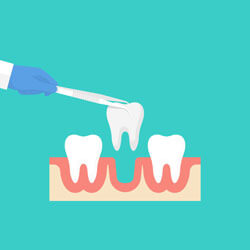Put Dry Mouth to Bed
Have you ever woken up with a mouth as dry as sandpaper? For some, it’s all too common. And while you (and your mouth) may feel better after a glass of water, there are other things you can do to limit dry mouth, also known as xerostomia, during sleep.

• Put a humidifier in your bedroom. Humidifiers help to increase moisture levels in the air.
• Don’t drink caffeinated beverages or alcohol in the evening before bed—both tend to dry out the mouth.
• Drink water or other sugarless beverages throughout the day to help keep you hydrated into the night.
• If you’re a “mouth breather”, try nasal strips to help open your nasal passageways, allowing you to breathe easier through your nose.
If you’ve given these tips a try and still find you’re dealing with dry mouth that isn’t getting better, ask us to recommend additional products at your next visit.
How to Prevent a Dry Socket
 If you’ve ever had a tooth extracted, you know the importance of keeping the cavity clean to avoid infection and other problems during the healing process. When we extract teeth at our practice, the most common complication a patient may experience is called a dry socket.
If you’ve ever had a tooth extracted, you know the importance of keeping the cavity clean to avoid infection and other problems during the healing process. When we extract teeth at our practice, the most common complication a patient may experience is called a dry socket.
A dry socket occurs when bone and nerve endings in the area of the extraction are left exposed due to improper healing. You can help avoid a dry socket by:
1. Eating soft foods and chewing carefully. We’ll give you a list of recommendations.
2. Avoiding straws. The ‘suction’ can disturb the healing process.
3. Drinking lots of water and avoiding sugary beverages.
4. Resting. This will help your body heal to the best of its ability.
If you’re in need of a tooth extraction, keep these tips in mind for a healthy and comfortable post-care routine.
We now have Online Booking !
Forgot to call us today to book your appointment or just didn’t have time ?
No problem, you can now book your appointment with us at your convenience.
Just visit our website or our Facebook page and click the “Book Appointment” button.


